Jackson is 2 years old, and he’s hungry all the time. He wants to eat. But chewing is just too difficult for him, and he struggles to eat every day.
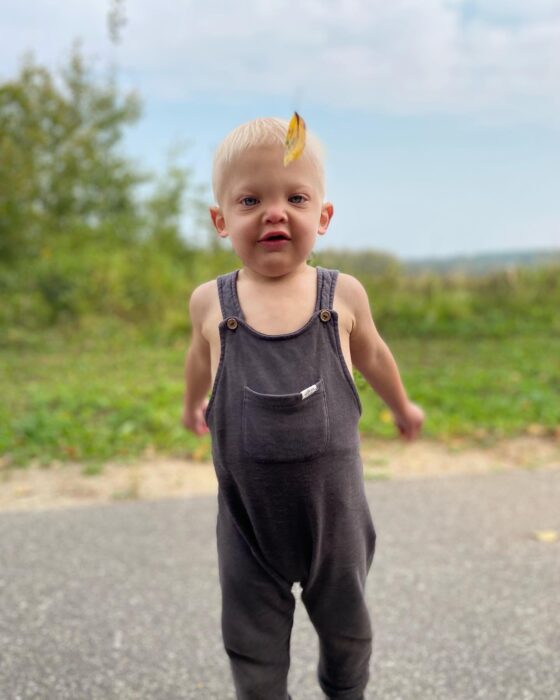
The blonde boy with the sparkling blue eyes has developed just one tooth because he’s affected by x-linked hypohidrotic ectodermal dysplasia (XLHED). Trying to chew with one tooth simply isn’t working. His mom, Victoria, says her sweet boy gets incredibly frustrated at meal time.
“He has outbursts at the table. He gets so frustrated that he can’t chew. Many times, he just wants to swallow the food whole instead of chewing it. If I serve mini shells pasta, he makes no attempt to chew it. So, he gags a lot, or even chokes.”
Victoria has had to pull him out of his high chair more than once to stop him from choking. And that can be scary. The family saw a dietician to help them figure out the food struggles they face.
“Jackson is a picky eater,” Victoria said. “We don’t know if that’s just him or because he can’t chew. He tries his hardest to eat meat, but he just can’t. So, now he doesn’t touch meat. I have to find alternative sources of protein for him. We serve him ‘safe’ foods. He eats a lot of cereal, potatoes, buttered toast and boiled vegetables.”
Dr. Kathleen J. Motil, a pediatric gastroenterologist at Texas Children’s Hospital and Professor of Pediatrics-Gastroenterology, Hepatology & Nutrition at Baylor College of Medicine, suggests a feeding approach called Baby-Led Weaning. Learn more about this strategy and how it may help your child with ectodermal dysplasia who does not have teeth learn how to eat solid food. Download our new library article: Feeding Solid Food to Children Without Teeth
Creating a Care Team
Victoria and her husband, Matthew, live in a small town in Canada. They are trying to find a dentist to see their boy. Likely, they will need to get a referral to a dentist in a larger city, which will require travel.
“I’m looking forward to getting an appointment set up and seeing how many teeth he may get and then figuring out next steps for dental treatment,” Victoria said.
To help Jackson with chewing, the family has started working with an occupational therapist. The therapist helps Jackson with moving his jaw up and down to learn chewing and help him with swallowing.
We always have to remind Jackson to chew when he’s eating and now just swallow it whole,” Victoria said.
– Victoria
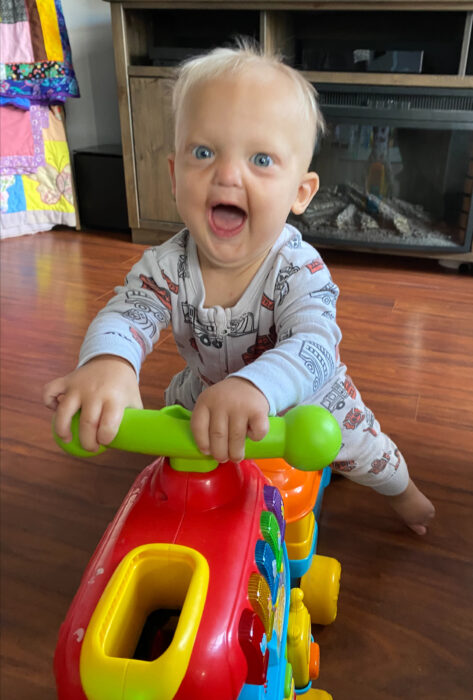
Even when he was six to 18 months old, Jackson struggled to eat. According to his mom, he just wanted to nurse rather than eat. It was a tough time and his parents didn’t know what to do. He would wake up through the night and be hungry.
Jackson’s lack of teeth doesn’t just affect his nutrition and eating. His speech is also delayed, and the toddler sees a speech therapist. When he can’t communicate what he needs, Victoria says he understandably gets frustrated and has tantrums.
Learning to Advocate
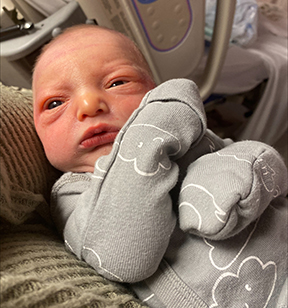
Jackson’s mommy has been his biggest advocate since he was born. Victoria and Matthew were told at his birth that he had some facial abnormalities. He had wide set eyes, low set ears and a flat bridge nose. Testing for chromosomal abnormalities came back normal.
“We took our sweet boy home and I was still very concerned something was going on with him. I would then bring up many things that he dealt with for the next year but not many things were being taken seriously by our family doctor. I started googling things and really thought, maybe he’s fine,” Victoria said.
But, his parents knew something was different.
At his one-year checkup, a nurse suggested the parents see an ear, nose and throat doctor in addition to a doctor that could evaluate the shape of his head. After a two-month wait, they saw the doctors. Finally, Victoria felt like someone was on her side and taking them seriously.
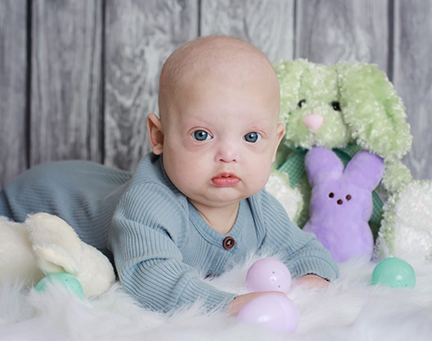
“I felt like all my hard work advocating for Jackson was finally being heard! The pediatrician listened to all my concerns, and we finally got referred to the genetics clinic in Edmonton, Alberta.”
After several genetic evaluations, the team suspected he did indeed have a genetic condition. The family proceeded with genetic testing and finally got answers when Jackson was 20 months old. He was affected by XLHED, and the genetic change was new in him. No one else in the family carried the gene.

“I found out I was pregnant with baby three, Finley, during the process of getting Jackson’s diagnosis. I was concerned about how our genetics were going to work. Was this something we passed on to Jackson? And would our future baby have it? I was scared of the unknown, for sure. But, at the same time I felt blessed that Jackson for the most part was living a happy little life. I wasn’t too concerned if our baby was to be diagnosed with it, too.”
XLHED Challenges
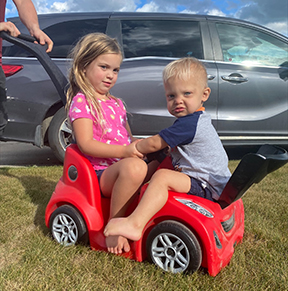
Jackson experiences all of the classic XLHED symptoms. Victoria and Matthew irrigate his nose daily to help prevent the foul smelling nasal rocks from forming. He gets ear infections and chest infections regularly and has had to be on antibiotics regularly. His skin breaks out with eczema. He gets hot easily because he isn’t able to sweat. Yet, it doesn’t stop Jackson from being an active 2-year-old.
“Jackson’s a very funny little guy. He is very active and keeps us on our toes. He enjoys everything with balls, cars and loves to jump off all our furniture. His favorite things to do are play basketball with his daddy, dance with his sister, Harper, and watch shows.”
Concerns About the Future
Jackson’s lack of teeth poses the biggest challenge for his family. Sending Jackson to day care wasn’t a big concern because Victoria works at the day care as a cook. She makes sure he gets food that is appropriate for snacks and lunch.
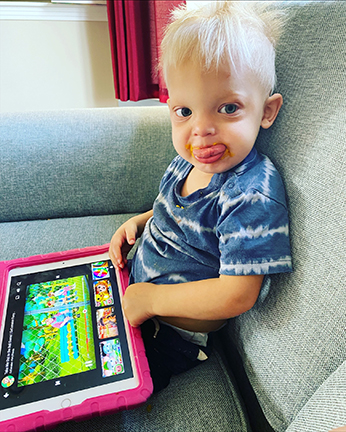
But Victoria’s worried about when Jackson moves to preschool. What should she pack in his lunch? What support will he have at meal time? It makes her nervous.
“In the beginning, I would say the unknown for his future was a big challenge for me as his mom. I want to make sure he’s happy and fits in with his friends. I want him to be able to eat the foods he wants. I want to make sure that he’s heard and that he’s not in any discomfort, which is hard at this moment with him only being 2.”
When she thinks about the future, she’s grateful to know she has support.
“What I have learned is that we are not alone. Now that I follow the National Foundation for Ectodermal Dysplasias (NFED) and their Facebook groups, it is wonderful to see how other families deal with this. That, yes, it comes with some challenges, but I think they are ones that we can work through.”
Jackson’s parents’ dream for him is to be happy and healthy.
I want him to be confident and know that he can do and be whatever he wants. I want him to challenge anything that comes his way and make sure he knows how special he is.
– Victoria
Victoria encourages other parents of children affected by ectodermal dysplasia to advocate for them and not think anything is too silly of a symptom.
“Take it day by day. Just love on them and make sure they are loved and happy. Talk to other families. You are not alone!”
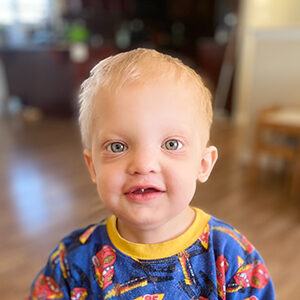
Our little guy is the same. He is seven and choking was a serious issue for us. We now have a bullet style blender which we use for bolognese and chunky stuff, peeled hotdogs, peeled cucumbers, crustless sandwiches, sushi… all big winners. Getting them to eat vegetables is key. It gets easier as they get older (less choking) but admittedly – a big challenge.
Our younger son, Cameron had the same problem with eating. Often he would say “I’m tired of trying to eat.” Keep at it. Milkshakes, pasta, protein shakes, let him eat often. Cameron grew up into an incredible young man (now 27) and was a collegiate cross country and Track runner!
What a great story. Cute little man. I am also a new mutation of XLHED. My son also has it. Having the NFED family will help you get thru some challenges. Life can be great, it just takes time to learn how to navigate some obstacles. Let him try everything -prepare for the worst but expect the best. You will be your son’s best advocate . Best wishes finding a dental care group.
My grandson also only has one tooth and he is 13. We made him protein shakes with fruit and frozen cauliflower. We chopped up his food into smaller pieces, even the macaroni because they still need and wanted to chew. We used a “ricer” to make all his food smaller and it all helped. Now as a teenager, he can eat soft tortilla tacos if the meat is fine and even some burgers if the meat is super tender. He still doesn’t have dentures so he has learned what he can eat. I want to encourage you that other people have gone before you and are thriving. Your beautiful son will find the things he likes. There are also protein bars that are easy to “chew” like the thin think creamy peanut butter bars. I hope this helps.
My son is also 2, we are still waiting on his genetic test for the exact type that he has, but as of now we are seeing no teeth whatsoever (on x-ray), sweat glands that are not active, and pale and thin white hair. I have no idea what we are doing most of the time but reading this has really helped me feel not so alone in this! Thank you for sharing.